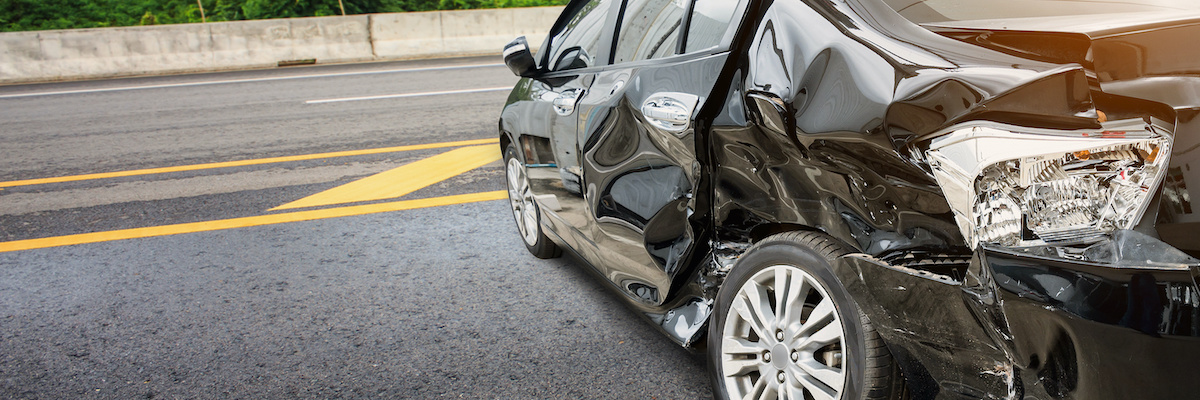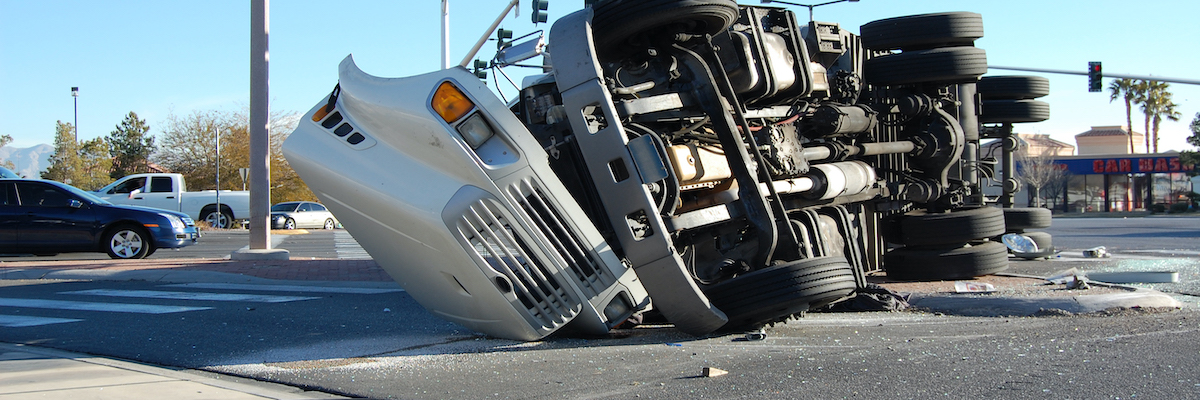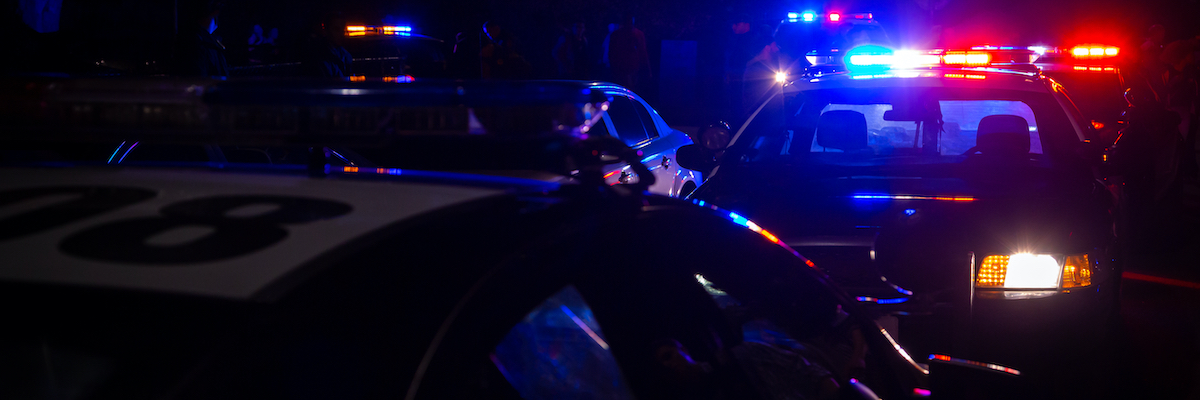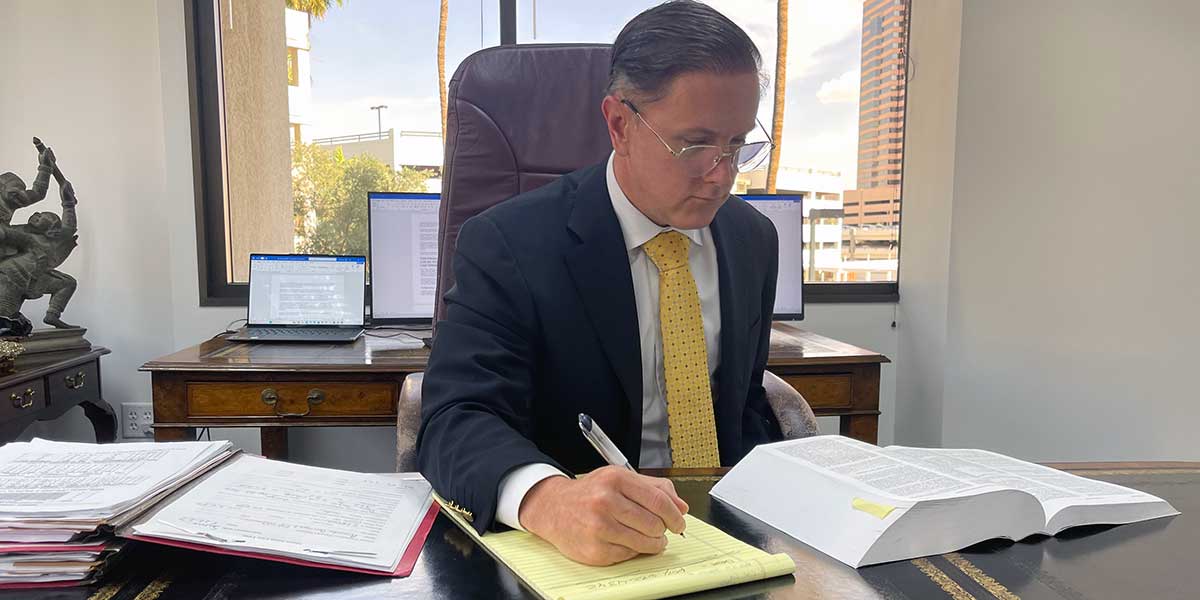Few charges are as deeply consequential as vehicular manslaughter. Attorneys at Kolsrud Law Offices, understand that this offense can upend lives, unravel families, and lead to profound legal ramifications.
In this article, we will review the various aspects of vehicular manslaughter in Arizona, including the legal definitions, potential penalties, and the crucial role of a well-prepared defense strategy.
ⓘ This article will cover the following topics:
- Understanding Vehicular Manslaughter Under ARS 13-1103
- Vehicular Manslaughter vs. Vehicular Homicide
- Establishing Criminal Negligence in Vehicular Manslaughter Cases
- Defenses To Vehicular Manslaughter Cases
- Penalties for Vehicular Manslaughter and Negligent Homicide
- How a Phoenix Criminal Defense Attorney Can Help
At its core, vehicular manslaughter involves the tragic intersection of human error and the law. This charge arises when the unintentional operation of a vehicle results in the loss of another person's life. Often times this is the case in aggravated DUI and wrong way driving incidents
❗Did you know that in recent years, Arizona has seen a notable increase in vehicular manslaughter cases? According to the Arizona Department of Transportation, there was a 15% rise in fatal motor vehicle crashes leading to manslaughter charges between 2018 and 2021. This underscores the importance of understanding the legal implications of such cases under Arizona law.
Contact us today to schedule a free consultation and learn more about how we can help you.

Understanding Vehicular Manslaughter Under ARS 13-1103
Vehicular manslaughter, an intersection of automotive operation and unforeseen tragedy, carries profound legal implications. At Kolsrud Law Offices, we are dedicated to unraveling the layers of this charge and guiding you through its challenges. In this section, we'll delve into the very essence of vehicular manslaughter under ARS 13-1103, exploring its definition, essential elements, and the legal framework that governs it.
▶ Definition and Legal Parameters of Vehicular Manslaughter
Vehicular manslaughter necessitates an understanding of its core definition. We'll explore how the law defines this charge, examining the pivotal role of unintentional actions leading to loss of life while operating a vehicle.
▶ Essential Elements of a Vehicular Manslaughter Charge
To establish a charge of vehicular manslaughter, certain elements must be present. We will guide you through these key components, which include:
- Demonstrating criminal negligence
- Establishing a causal link between the defendant's actions and the fatal outcome
- Addressing the legal implications of operating a vehicle under varying circumstances.
▶ Differentiating Between Vehicular Manslaughter and Other Offenses
Clarity between vehicular manslaughter and related charges is pivotal. I will elucidate the distinctions between vehicular manslaughter and charges like negligent homicide, helping you understand the nuanced differences and potential scenarios in which each charge might apply.
In the next sections, we will dig deeper into the core elements that define vehicular manslaughter in Arizona, explaining the difference in charges, potential defenses, and the importance of skilled legal representation.

Vehicular Manslaughter vs. Vehicular Homicide
In the complex topic of vehicular-related legal offenses, differentiating between vehicular manslaughter and negligent homicide holds profound significance.
Typically, the difference between vehicular manslaughter and vehicular homicide comes down to your disregard for safety and awareness of risk while driving.
For example, if you were excessively speeding, driving under the influence, running a red light, or driving the wrong way on the freeway, causing an accident where another person died, you could be charged for vehicular manslaughter.
In contrast, negligent vehicular homicide can apply if you failed to recognize a risk while driving such as reckless driving.

Establishing Criminal Negligence in Vehicular Manslaughter Cases
Establishing negligence in a vehicular manslaughter charge is at the core of the prosecution's argument. In this section, we'll explain the nature of criminal negligence in vehicular manslaughter cases and its pivotal role in determining liability.
▶ Factors Determining Criminal Negligence:
Determining criminal negligence in vehicular manslaughter cases in Arizona is a complex process that revolves around a combination of legal principles and factual evidence. Key factors include the accused's awareness of risk, the reasonableness of their actions compared to what an ordinary person would have done, and the degree of deviation from that standard.
Furthermore, the presence of alcohol, drugs, or reckless driving behaviors, such as speeding or ignoring traffic signals, can weigh heavily in determining criminal negligence.
Expert testimony from forensic analysts, accident reconstruction specialists, or medical professionals can also play a significant role in assessing the accused's actions against the standard of care expected from a reasonable person in similar circumstances.
▶ Example Scenario 1: If a driver is found to be operating a vehicle at twice the legal speed limit in a residential area and causes a fatal accident, this excessive speeding may be considered as a gross deviation from what a reasonable person would do, leading to a finding of criminal negligence under Arizona's laws.
▶ Example Scenario 2: Conversely, if a fatal accident occurs due to a driver briefly looking away from the road but without other aggravating factors like intoxication or reckless behavior, it may be more challenging to establish criminal negligence. The behavior might be considered careless but not necessarily a gross deviation from reasonable conduct, making it a more complex legal matter to resolve.
▶ Evaluating the Role of Impairment:
The role of impairment, whether due to alcohol, drugs, or other substances, is often the main focus to evaluating criminal negligence in vehicular manslaughter cases in Arizona. Under Arizona Revised Statute § 28-1381, driving under the influence (DUI) is explicitly prohibited, and impairment can serve as evidence of a gross deviation from the standard of care expected from a reasonable person. This deviation must be substantial and unjustifiable, and the connection between impairment and the fatal accident must be clear.
Impairment not only affects a driver's ability to operate a vehicle safely but also their judgment, reaction time, and awareness of surroundings. This can lead to actions that may otherwise seem unreasonable or reckless. A skilled legal examination of impairment includes analyzing toxicology reports, police observations, and any prior convictions for DUI.
It's important to note that the mere presence of impairment doesn't automatically establish criminal negligence; it must be connected to the behavior that directly led to the fatality.
▶ Example Scenario 1: A driver with a blood alcohol concentration (BAC) of 0.15%, well above the legal limit of 0.08% in Arizona, collides with another vehicle, causing a fatality. Further investigation reveals that the driver was swerving across lanes and failed to obey traffic signals. In this case, the substantial impairment may contribute to a finding of criminal negligence, given the clear connection between intoxication and reckless driving behavior.
▶ Example Scenario 2: A driver involved in a fatal accident may have traces of a prescription medication in their system but demonstrates no signs of erratic driving, disobeying traffic laws, or other behaviors indicative of impairment. In such a case, the presence of the substance alone may not be sufficient to establish criminal negligence. Legal analysis would need to closely scrutinize the level of impairment, if any, and its direct impact on the driver's actions leading to the accident.

Defenses To Vehicular Manslaughter Cases
When charged with vehicular manslaughter your case demands a strategic and well-considered defense. At Kolsrud Law Offices, we are dedicated to building effective defense strategies that safeguard your rights and future.
In this section, we'll explore the potential defenses and legal strategies available when facing a vehicular manslaughter accusation under ARS 13-1103.
▶ Challenging the Evidence:
One of the cornerstones of a strong defense involves scrutinizing the evidence presented by the prosecution. This can encompass examining witness testimonies, accident reconstruction reports, and any forensic evidence. By identifying inconsistencies, biases, or errors in the evidence, we can build a compelling case that challenges the prosecution's narrative.
Whether it's disputing the accuracy of blood alcohol tests or casting doubt on the reliability of eyewitness accounts, a comprehensive analysis of the evidence can significantly impact the outcome of the trial.
▶ Proving Lack of Criminal Negligence:
Given that establishing criminal negligence is the most important factor to a vehicular manslaughter charge, one effective defense strategy involves demonstrating that the defendant's actions did not meet the threshold of recklessness required for a conviction.
By displaying responsible driving practices, adhering to traffic laws, and illustrating the absence of factors like impairment or distracted driving, we can cast doubt on the element of criminal negligence. This approach can create reasonable doubt in the minds of jurors, leading to a favorable verdict.
▶ Exploring Mitigating Circumstances:
In some cases, presenting mitigating circumstances can play a pivotal role in shaping the outcome of a vehicular manslaughter trial.
Factors such as unforeseeable emergencies, sudden mechanical failures, uncontrollable elements such as bad weather, or situations where the defendant's actions were influenced by external factors can be leveraged to argue for reduced culpability.
By strategically incorporating these mitigating factors into the defense strategy, we can advocate for a more lenient sentence or even a dismissal of the charges.

Penalties for Vehicular Manslaughter and Negligent Homicide
Vehicular manslaughter and negligent vehicular manslaughter (negligent homicide) in Arizona carry distinct penalties reflecting the seriousness of the offenses. Detailed consideration of these penalties reveals significant consequences that go beyond imprisonment and fines, affecting various aspects of an individual's life.
▶ Vehicular Manslaughter if Convicted:
- Imprisonment:
- Class 2 Felony: 4 to 10 years, potentially extended to 12.5 years for prior felony convictions.
- Class 3 Felony: 2 to 8.75 years, with possible enhancement for prior felonies.
- Fines: Up to $150,000, plus surcharges, and additional fines for prior convictions.
- Probation: Ranging from 3 to 5 years, depending on the case and any prior misdemeanor or felony convictions.
- Community Service: Length determined by the court, often ranging from 100 to 400 hours.
- MVD Penalties and Loss of Driving Privileges: A 3-year revocation of the driver's license under ARS 28-3304 and ARS 28-3315. Reinstatement requires completing a Revocation Application and satisfying court or MVD requirements like paying all fines or completing traffic survival school.
- Permanent Criminal Record.
▶ Negligent Vehicular Manslaughter (Negligent Homicide) if Convicted:
- Imprisonment: 1 to 3.75 years, with potential enhancement for prior felony convictions.
- Fines: Up to $150,000, plus surcharges, and additional fines for prior convictions.
- Probation: Generally ranging from 2 to 4 years, with variations based on prior convictions.
- Community Service: Length is court-determined, typically ranging from 80 to 300 hours.
- Potential Loss of Driving Privileges: Depending on the circumstances, the court may decide to impose restrictions on driving privileges.
- Permanent Criminal Record.
These penalties, particularly when coupled with prior misdemeanor or felony convictions, can substantially escalate the legal consequences.
The combination between criminal court consequences and MVD penalties further outline the importance of a comprehensive legal approach to defending against vehicular manslaughter or negligent vehicular manslaughter charges in Arizona.
Below is a quick overview of these penalties.
| Penalty | Vehicular Manslaughter | Negligent Vehicular Manslaughter |
|---|---|---|
| Charge Classification | Class 2 or Class 3 Felony (§ 13-1103) | Class 4 Felony (§ 13-1102) |
| Imprisonment | 4 to 10 years (Class 2), 2 to 8.75 years (Class 3) | 1 to 3.75 years |
| Fines | Up to $150,000, plus surcharges | Up to $150,000, plus surcharges |
| Probation | 3 to 5 years | 2 to 4 years |
| Community Service | 100 to 400 hours | 80 to 300 hours |
| MVD Penalties and Loss of Driving Privileges | 3-year revocation, Revocation Application required | Potential restrictions based on court decision |
| Permanent Criminal Record | Yes | Yes |

How a Phoenix Criminal Defense Attorney Can Help
Vehicular manslaughter or negligent homicide charges in Arizona are not just serious legal matters; they can alter the course of your life. This is why you need AV-rated defense attorney Josh Kolsrud on your side to fight for you.
▶ Proven Experience and Expertise
- Former State Prosecutor: Josh's previous role as a state and federal prosecutor provides him with a distinct perspective on the prosecution's tactics and methodologies.
- Impressive Legal Accomplishments: His involvement of over 3,500 cases, including more than 100 jury trials in Arizona, reflects his extensive legal proficiency.
- Expertise in Vehicular Manslaughter: His specialized knowledge in vehicular manslaughter laws and the intricacies related to these cases distinguishes him from other defense attorneys.
▶ Unwavering Commitment to Clients
- Tailored Legal Strategy: Our law firm dedicates the necessary time to understand every aspect of our client's case, developing a defense approach that is well-suited to the individual situation.
- Client-Focused Philosophy: Our commitment to clients goes beyond mere legal counsel, offering guidance, compassion, and reassurance throughout the legal process.
▶ Free & Thorough Consultations
- Detailed Case Analysis: Our law firm provides no-cost consultations, where all aspects of the case are evaluated from every angle. It is critical that no element is missed in shaping a successful defense.
- Strategic Vision: During the consultation, possible defense tactics are explored, and a transparent plan for the case is outlined.
▶ Determination to Construct a Winning Defense
- Exhaustive Investigation: Our legal team utilizes multiple skills to conduct comprehensive investigations, questioning the prosecution's evidence, and discovering details that may strengthen the defense.
- Negotiation and Court Representation: Whether obtaining a beneficial plea bargain or aggressively advocating the case in court, we are devoted to getting the best outcome for our clients.
By offering in-depth free consultations, we ensure that every client receives the personalized attention and assertive defense they need.
Facing a vehicular manslaughter charge is an intimidating obsticle, but with the backing of Phoenix criminal defense attorney Josh Kolsrud, you can rest assured that your case is in the hands of one of Arizona's leading criminal defense attorneys. Give us a call today!
Contact us today to schedule
A FREE CONSULTANT and learn more
about how we can help you.
An award-winning criminal defense attorney Since 2006
Why Choose Josh Kolsrud
With over 100 jury trials to his name, and years of experience as a state and federal prosecutor, Josh understands the law, the legal process, and your rights. Josh is also committed to representing every client with utmost integrity and dedication
Experience
Josh has prosecuted major crimes on the state and federal level, led a successful anti-human sex trafficking operation that saved lives, and argued before countless juries and justices for his clients
Expertise
Josh is an expert in both Arizona and federal criminal law, and is ready to put that expertise to work for you.
Dedication
As a prosecutor, Josh saw far too many defendants lose their livelihood due to poor representation. Josh will always give every client his complete attention and effort
Get a Free Initial Consultation:
Please complete our form below to get a free initial consultation
or call us at (480) 999-9444.
